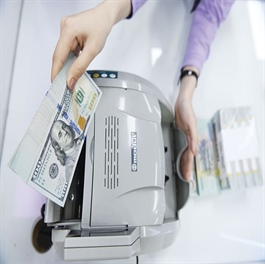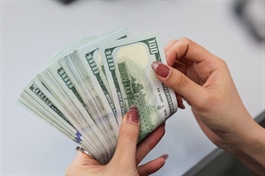Short-term traders highlight risk from securities tax change
Short-term traders highlight risk from securities tax change
A proposal to introduce a 20 per cent tax rate on net profits from securities trading is drawing significant attention from the investment community.
In the draft Law on Personal Income Tax, the Ministry of Finance (MoF) has proposed setting the rate at 20 per cent of net profits, after deducting relevant expenses. The move has sparked some attention, particularly among individual investors who say the proposed rate may affect post-tax profits, especially given the stock market’s current volatility.

Short-term traders highlight risk from securities tax change, Photo AI-generated |
Tran Manh An, an investor from Hanoi with 10 years of experience, said the proposed tax would especially disadvantage short-term traders.
“I usually trade with capital of around $10,000–30,000. Annual profits fluctuate from zero, or even losses, to 15–20 per cent at most. If profits are taxed 20 per cent, then in low-profit or loss-offset years, I will be worse off,” An said. “I will consider moving to safer investments like savings or suburban land, which are less volatile, do not require me to watch the board every hour, and preserve capital.”
Similarly, Le Thanh Vinh from Ho Chi Minh City said the new tax could discourage risk-taking among retail investors.
“The stock market is already risky, and adding a 20 per cent tax on profits shrinks potential rewards even more. If my net profits drop significantly, I would rather shift to rental property instead,” Vinh said.
If tax policies are not carefully balanced between state revenue goals and market incentives, capital flight from the stock market to other investment channels could occur, affecting not only market liquidity but also businesses’ ability to raise capital, Vinh added.
Since 2007, Vietnamese individual investors have paid a 0.1 per cent flat tax on the total sale value of transactions, regardless of whether they made a profit or loss. This mechanism has been simple and stable for state revenue collection, but it has created a long-standing paradox in which even losing investors still pay tax.
Nguyen Son, chairman of the Vietnam Securities Depository and Clearing Corporation, said the current model is easy to apply and collect but unfair. He supports taxing actual profits, arguing that it better reflects investment outcomes, particularly benefiting foreign institutional investors.
“In principle, taxing net profits aligns more closely with the true nature of investing, as tax is only paid when income is generated. It also encourages long-term, effective, and transparent investments, following global practices,” he said. “This shift is particularly relevant as Vietnam pushes to upgrade its stock market to emerging market status,” Son said.
However, lawyer Nguyen Thanh Ha from SB Law said that under the current personal bands of 5-35 per cent, the proposed 20 per cent is considered high for long-term investing.
“Applying the same rate to all individuals without classification is rigid and may have the opposite effect of discouraging individual investment in stocks,” he said. “Tax policies must balance state interests with taxpayers’ ability to comply.”
While a profit-based tax is fairer, implementation feasibility poses challenges. Calculating profit by stock code and per account across various brokerage firms would require a synchronised, accurate, real-time data system connecting banks, brokerages, and tax authorities.
According to personal finance expert Nguyen Kim Lien, Vietnam can learn from regional practices. Indonesia, the Philippines, and Thailand – whose stock markets are also considered emerging and whose GDP per capita is similar – apply lower securities taxes than Vietnam’s proposed rate.
In developed markets such as China, the US, Japan, Germany, and France, tax on net profits ranges from around 15-30 per cent, but requires annual self-reporting by investors. However, Lien noted that these markets have high liquidity and diverse financial products, and many apply flexible tax rates depending on type.
“The proposed 20 per cent tax on capital gains could be appropriate for developed markets, but Vietnam still needs to build a diverse investment ecosystem before adopting such a model,” she said. “Vietnam must prepare adequately before transitioning to ensure the capital market remains functional and beneficial to both the economy and investors.”
For the past 15 years, the Vietnamese stock market returned an annual average of 9–12 per cent. After a 20 per cent tax, the net return would be just 8–10 per cent, Lien estimated. With market volatility averaging 23 per cent – nearly three times the expected return – the stock market may no longer be attractive.
“This new policy could affect investor sentiment, especially when financial literacy is still low and investment options are limited. Attracting capital to the stock market will be more difficult,” she said.
Pham Tien Dat from the Institute of Economic and Financial Policy and Strategy under the MoF said a comprehensive reform plan is more essential. This should include distinguishing between listed and unlisted assets; differentiating between individual and institutional, and domestic and foreign investors; encouraging long-term accumulation through preferential or conditional tax exemptions; investing in data systems connecting tax, banks, and brokerages; and ensuring a reasonable, transparent transition roadmap based on Vietnam’s conditions and extensive consultation.
“Good tax policy should function as a driver of growth. When well-designed, it can stimulate investment, elevate the capital market, and build investor confidence, especially among individuals, who play an increasingly vital role in the economy,” Dat said.
"This new policy could negatively affect investor sentiment, especially when financial literacy is still low and investment options are limited. - Nguyen Kim Lien, personal finance expert"
- 10:43 22/08/2025




























